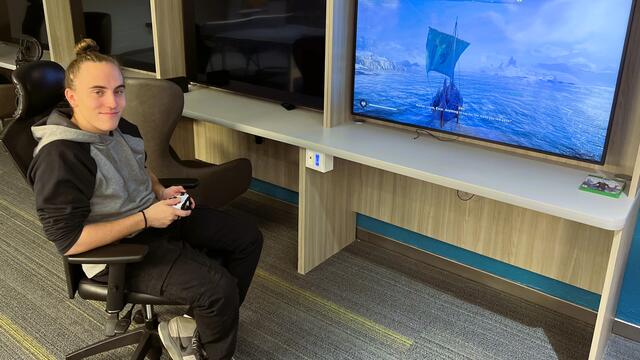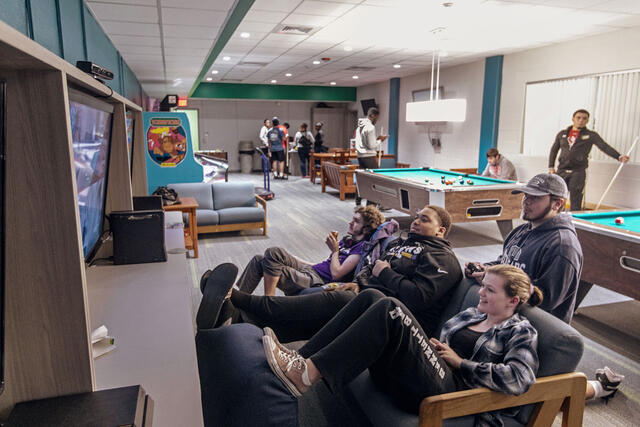Students explore history in video games for this First Year Seminar class
In The Middle Ages though Video Games, Lecturer in History Jillian Bjerke is guiding first-year students through a journey into the past with video game play. A First Year Seminar, the course pairs an academic subject with an introduction to McDaniel and the college experience.

Peer Mentor Dan Johnson plays "Assassin's Creed: Valhalla" in the McDaniel Rec Lounge, where video games for the FYS The Middle Ages Through Video Games are available to play for students enrolled in the course.
What happens when a historian sits down to play a video game set in the past?
Easy, she designs a First Year Seminar (FYS) called The Middle Ages through Video Games.
Lecturer in History Jillian Bjerke spends a lot of time thinking about the Middle Ages — it’s her research specialty, after all — and often encounters re-envisioned versions of the era in video games.
“The Middle Ages has a certain reputation in popular culture that is not nuanced and is often inaccurate,” Bjerke says. “Game makers play into that. It’s fascinating to see where they’ve made conscious changes or diversions from the historical record and what the effects of those choices might be.”
It’s been a dream of hers to design a class that explores the Middle Ages through video games, but she was always stymied by logistics. Until she came to McDaniel and could incorporate the college’s own Rec Lounge as an academic resource.
With communal video game consoles, the lounge made it possible to do what many college students ardently wish all of their instructors would do — assign video games as homework.
A Video Game for Each Era
Early Middle Ages: "Assassin's Creed: Valhalla"
High Middle Ages: "Assassin's Creed"
Late Middle Ages: "A Plague Tale: Innocence"
+ primary text readings from the ages.
Playing video games the academic way
In Bjerke’s FYS, first-year students are playing three games as entryways into larger conversations about documented history versus depictions of history.

Typically a recreation space on campus, the Rec Lounge has a new life this semester as an FYS resource.
“I pair each game with readings from the actual Middle Ages,” Bjerke says. “For example, when we were seeing churches, monasteries, and pagan temples in-game, we read historical accounts of what those looked like and what happened in those places.”
Through rigorous comparison, the students learn to think like historians and form academic critiques. They look at how intentional choices by game makers impact how players may perceive different time periods.
According to a study by the Entertainment Software Association, two-thirds of Americans play video games, including all genders, ages, races, and backgrounds. Of the gamers in the study, 44% said they played to “use my brain,” so why not harness that for a class?
“I like learning about the historical differences between actual history and the games and why things were changed. We’ve even learned a bit about game design,” says first-year student Maya Colavito of Rockville, Maryland.
Video games inspire broad conversations
References to historical events in the games, like the 869 C.E. Zanj Rebellion in the Middle East, make great conversation starters in class. Architecture, the organization of cities, cross-cultural trade, and religion are ripe for discussion, too.
The students cover centuries: from “A Plague Tale: Innocence,” set in southern France in 1348 during the Black Plague, to “Assassin’s Creed,” set in 1191 during the Third Crusade in the Middle East, to “Assassin’s Creed: Valhalla,” set in the years 872-878 during Viking invasions of the British Isles.
"[Video games] are part of a larger conversation about how history is presented to the public, even if their purpose is just to entertain." - Bjerke
“It’s very interesting to learn the actual history and see how it correlates to the games,” says Jake Taylor, first-year student from New Windsor, Maryland. “We get a full representation of each time period.”
During a visit to The Walters Art Museum in Baltimore, students also saw physical pieces of history. “I wanted students to see actual objects from the periods that we’re playing in the games — the physical inspirations for things in-game,” Bjerke says, like Viking jewelry and weaponry.
According to Bjerke, video games deserve as much analysis as films and novels. “They’re part of a larger conversation about how history is presented to the public, even if their purpose is just to entertain,” she says.
Studying video games also prepares students for conversations in modern academic circles. The medium has become the subject of a large share of academic scholarship, as Bjerke witnessed during the International Medieval Congress in summer 2023.
“Hearing how many scholars were discussing video games was really influential in forming this course,” she says.
A class that supports the first-year experience
FYS courses support first-year students during the transition to college. In addition to learning academic skills in the classroom, students attend First Look Sessions to become acquainted with campus resources like Hoover Library and the Center for Experience and Opportunity.
“It’s not the typical class,” says Eric Coates of Dundalk, Maryland. “We get to have conversations and share our experiences, thoughts, and opinions.”
Bjerke serves as the students’ academic advisor, while peer mentor Dan Johnson, a junior History major, supports them during the class and throughout their time at McDaniel.
“While I only have 14 mentees this year,” Johnson says, “I had 18 last year, and I consider all 32 of these students to be my mentees. I will always be here to help them.”
By the end of the course, Bjerke hopes students “have a nuanced understanding of the Middle Ages and think critically about stereotypes about the past and how those are used today in order to combat them,” she says.
“It’s a fantastic class taught by one of my favorite professors,” Johnson says. “Dr. Bjerke is a fantastic educator who has such a vast depth of knowledge and is extremely passionate about the subjects she teaches. It is hard to not raise yourself to her level of passion and excitement when in class with her.”
For the final hurdle in the course, students will propose their own video game set in a historical setting. What will they keep historically accurate and what might motivate them to get creative? With centuries to choose from, they’ll have their work cut out.